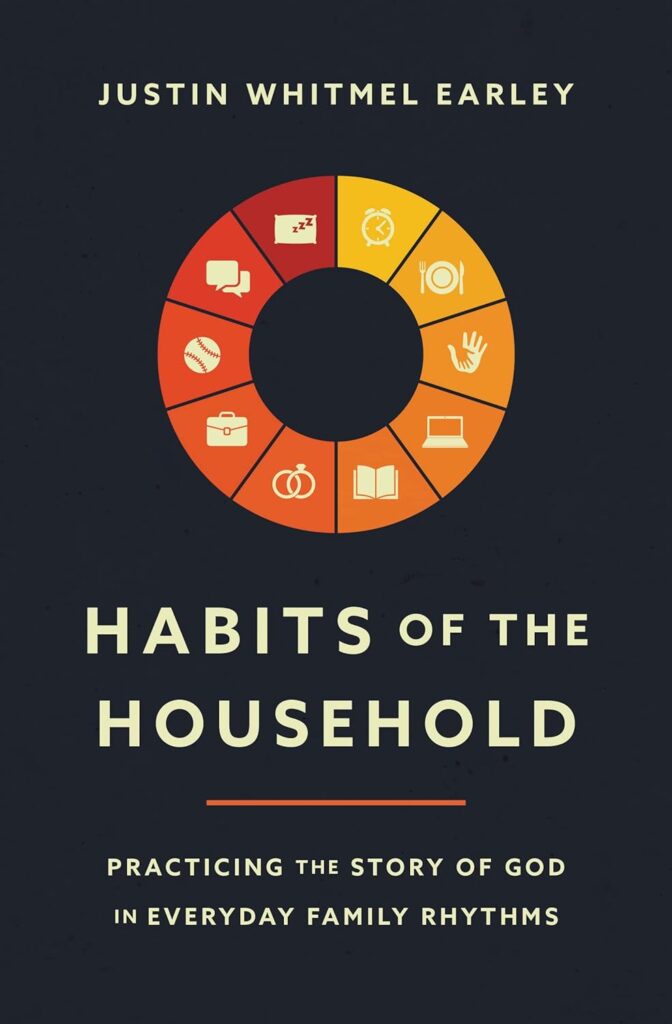A mini review of Habits of the Household: Practicing the Story of God in Everyday Family Rhythms, by Justin Earley.
Everything that we habitually do is its own liturgy, author Justin Earley proposes in Habits of the Household. He discusses the liturgies of leaving the house, of sitting down for a meal, and of tucking children into bed. Will they remember our patterns of impatience and anger, or of peace and Godward focus? Parenting, he points out, is a long process of revealing who you are. And our kids will remember who we really are more than what we said.

Habits isn’t a theoretical book. It’s one grounded in practicality, as the author admits that with four boys his attempts at forming beautiful liturgical moments in the day often are punctuated by children arguing or spilling water on the floor. My husband and I chuckled several times during our reading of this book as one of his stories would hit way too close to home for us.
I particularly like the chapter on discipline. The author points out our need to parent with God’s help, pausing for a moment of prayer. He encourages parents to respond from love and retrain our “knee jerk reactions” to be positive ones and not our sinful natures’ inclination. We aren’t there just to “control” their behavior but to “find them,” just as God finds us. (Ch. 3) My favorite piece of advice was that we recognize that we commit those same sins that our child has just committed before disciplining the child. So, for example, if we are correcting a child for an outburst of anger toward his sibling, we might first reflect on how God has forgiven us for our own anger.
How do we decide what habits are most important? The rhythms of our households should be in sync with the rhythms of our local church, the author insists in his chapter about work and rest. He calls us to draw our children toward God in every simple ritual (liturgy), from bedtimes to meals to play.
On Prayer:
Earley points out that God cares as much about a child’s simple prayers as an adult’s. Our desires aren’t more valuable than a child’s simply because our desires are older!
On Screen Time
A valuable question Earley asks: “Are you forming children or allowing screens to form them?”
The author discusses screen time as a battle for formation. Why say no so often as a parent? “To help your child say no to their infinite desire.”
Did this book change the way we parent our children?
Not significantly. What it did change, though, is the way I think about certain routines. When we leave the house for church now, I’m more likely to have done some preparation to make that leaving process less hurried and tense. (Breakfast thought of ahead of time, clothes laid out, etc. And I did say more likely, not that it will always happen! I do still have a very young baby in the house.)
I highly recommend taking the time to talk through your own household liturgies with your spouse! You can find Habits of the Household here.
More book reviews HERE. You may also enjoy reading “The Reality of Parenting.”


 : a favorite place to walk when we can!
Once
: a favorite place to walk when we can!
Once 
![The first photos are of my parents’ sprawling rural Arkansas garden. The last is of my tiny little beds in the big city. Plants bring life to even the smallest corner!
I’ve been reading some beautiful fiction this year, and I just posted a review of a book by one of my favorite authors, Leif Enger. (https://therestfulhome.com/brave-young-handsome-review/ in your browser, or click on the link in my Instagram profile) If you don’t have time to read the book, though, here’s just a quote or two for your enjoyment:
🎼
“Death arrived easy as the train; [he] just climbed aboard, like the capable traveler he was.”
🛤️
On riding a horse: “You are a feeble and tenuous being; the only thing a horse wants from you is your absence.” 🐎 😄
#quotes #leifenger #amreading #gardens #gardening](https://scontent-atl3-1.cdninstagram.com/v/t39.30808-6/468657020_18342474787176025_4442629541396867851_n.jpg?_nc_cat=108&ccb=1-7&_nc_sid=18de74&_nc_ohc=DEja6UP2ct4Q7kNvgEYJxCM&_nc_zt=23&_nc_ht=scontent-atl3-1.cdninstagram.com&edm=ANo9K5cEAAAA&_nc_gid=AA4bBsvQ_JpqZXLUPUTpTC8&oh=00_AYCjI9LUx-cJxe6cu0n7H1Gounaz92aBlTrQacnKut8umg&oe=67567CAB)
















